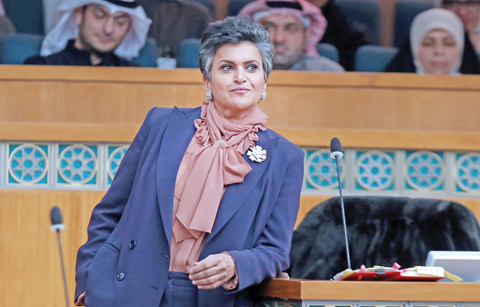 File photo of MP Safaa Al-Hashem is seen during a session of the National Assembly. — Photo by Yasser Al-Zayyat
File photo of MP Safaa Al-Hashem is seen during a session of the National Assembly. — Photo by Yasser Al-ZayyatKUWAIT: MP Safaa Al-Hashem said yesterday her proposal to ban giving medicines to expatriates at public hospitals and clinics aims at improving health services for Kuwaiti citizens and achieve what she described as "social justice". Hashem, the only woman in the 50-seat National Assembly, proposed a few days ago that the health ministry should stop giving expatriates any medicines at public clinics and hospitals.
She said the KD 1 and KD 2 paid by expatriate patients at clinics and hospitals respectively should be considered as examination fees to allow them to be seen by doctors. She said expat patients should then purchase the prescribed drugs from private drug stores. Her proposal was harshly criticized as inhuman, especially by online activists. She told a press conference held to explain her proposal that it aims at organizing the medical sector and allowing Kuwaiti patients easy access to the government-run health sector.
Hashem said that what she proposed is nothing new, as all the five Gulf Cooperation Council (GCC) member states are implementing it. In those countries, expatriates are barred from public health services. The lawmaker claimed that expatriate doctors prescribe large quantities of medicine to expatriate patients and this leads to squandering of public funds. "How else can we improve the level of health services in the country?" Hashem asked, adding that expatriate patients overcrowd public health institutions, thus preventing citizens from having good medical treatment.
Hashem said that what she has proposed has got nothing to do with humanity. "I don't want anyone to ask me where are human factors in my proposal. I am talking about the dignity of citizens ... I did not say don't give them (expatriates) treatment. I said we should regulate it in order for Kuwaiti citizens to experience social justice," she said. "The government is not obliged to provide medical treatment to expatriates. Employers are obliged to provide such a service," she added.
Hashem called for immediately forcing employers to provide health insurance for their expatriate employees, adding this will resolve most of the problem. The lawmaker also claimed that some expatriate visitors who do not hold legal residence permits arrive in Kuwait to enjoy almost free medical services, while many Kuwaitis are forced to go to the private sector.
Hashem said that the health ministry budget soared from KD 437 million in 2006 to as high as KD 1,489 million last year, close to fourfold growth. She also said that in 2015, as many as 465,000 Kuwaitis visited outpatient clinics at public hospitals against 331,000 expats, adding that the large number of expatriates resulted in overcrowding. In addition to barring expats from medicines, Hashem had also proposed collecting a five percent tax on all foreign money transfers by expats. She has also called for charging each expat at least 100 fils for walking on roads.
By B Izzak







